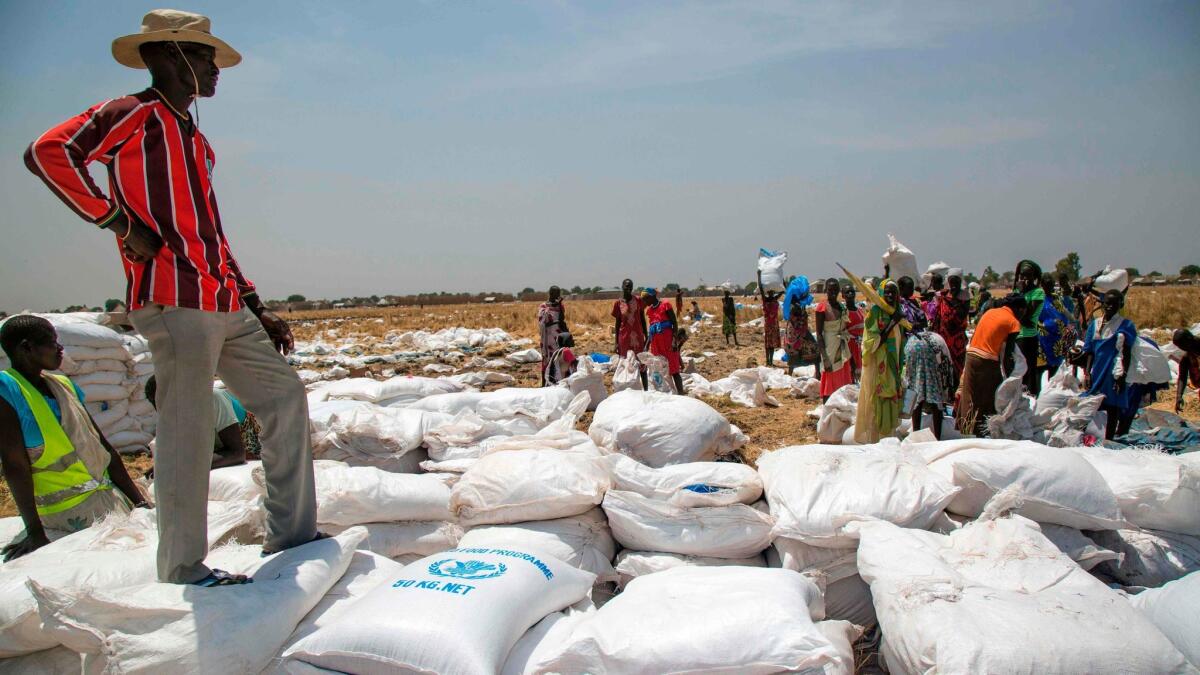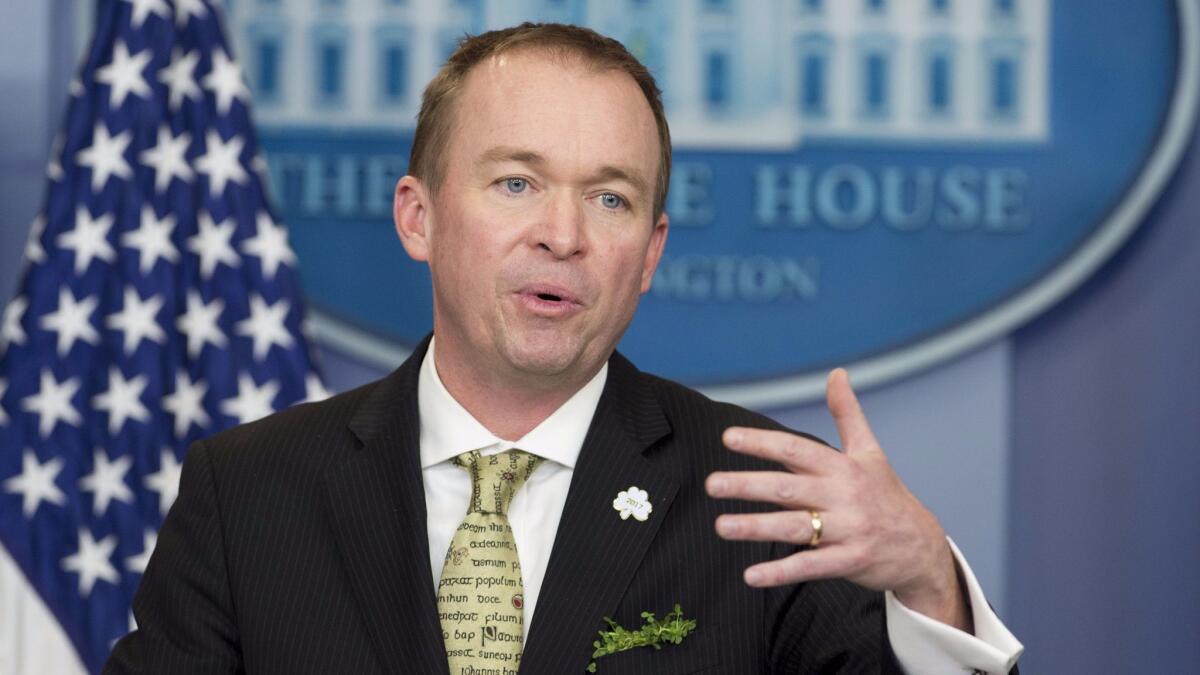With 20 million people facing starvation, Trump’s foreign aid cuts strike fear

- Share via
Reporting from JOHANNESBURG, South Africa — President Trump’s proposed budget cuts to the United Nations, which runs agencies such as the World Food Program and UNICEF, come at a time when famine is reaching a crisis point in parts of Africa, and children in some countries are dying of starvation.
The timing of the proposed cuts has sent chills through the international aid community, which fears that a retreat by the U.S. in relief funding could make a bad situation worse.
Just days before Trump’s budget was released, U.N. humanitarian chief Stephen O’Brien warned that the globe is facing its worst humanitarian crisis since the end of World War II.
Two years of drought and failed rains across much of Africa have affected 38 million people in 17 countries.
Without a massive donor injection of $4.4 billion, aid officials estimate, more than 20 million people face starvation and famine in Nigeria’s northeast, South Sudan, Somalia and Yemen. The disaster is likely to leave countries fragile for years to come.
The United States, through its humanitarian aid and support for the U.N., has traditionally been at the forefront of global efforts to avert catastrophes such as famine, and to relieve the effects of drought on some of the world’s poorest people.
The budget process involves negotiations between the White House and Congress that could see changes in Trump’s proposal to slash funding for the State Department, as well as the U.S. Agency for International Development and other international programs, by 28%, or $10.9 billion, as he seeks to increase military spending by $54 billion next year.
But Scott Paul, senior policy adviser at the humanitarian agency Oxfam, said Trump’s budget blueprint sent tremors of alarm through the humanitarian community.
“The message that it sends is that the U.S. is no longer interested in leading or being part of global efforts to mitigate suffering in the world,” he said.
Even before Trump’s blueprint was unveiled, there wasn’t sufficient global support for U.N. and humanitarian efforts to stave off catastrophes in South Sudan, Somalia, northeastern Nigeria and Yemen, Paul added.
“We have these four emergencies on the verge of famine, which from our point of view already signal a failure of will to prevent this historic level of suffering,” he said.
“Maybe our biggest concern is that looking forward we will see this crisis spiral out of control because the U.S. is stepping away from the table when it comes to the overarching priority of shared prosperity and a stable and peaceful world,” he said.
For decades, the U.S. has been the largest supporter of the World Food Program as part of a bipartisan congressional commitment to averting famine and starvation. In 2016, the U.S. paid 24% of the food program’s $8.6-billion budget, or about $2 billion.
But in the future, other countries will have to step up to provide a greater share of disaster assistance, Secretary of State Rex Tillerson said in Japan on Thursday.
“I think it sends a message that the U.S. is turning inward at a time when we are facing these unprecedented crises that require increasing U.S. engagements and humanitarian assistance,” said Bernice Romero, senior director for policy and humanitarian response at Save the Children. “In 2016 the U.S. contributed $6.4 billion in humanitarian assistance, the largest in the world. Cutting its funding at a time of looming famine in four countries and the world’s largest displacement crisis since World War II is really unconscionable and could really have devastating consequences.”
Parts of South Sudan and northeastern Nigeria have already experienced famine in the current crisis, with humanitarian agencies warning that Somalia, where half the population is in dire need of help, could be next.
The largest fear for us as humanitarians is that there will be less assistance to save lives in the future.
— Bernice Romero, senior director for policy and humanitarian response at Save the Children
At present levels, the U.S. also funds 40% of the Office of the U.N. High Commissioner for Refugees, 22% of the U.N. Secretariat, as well as 28% of the cost of U.N. peacekeeping operations in places such as South Sudan, the Democratic Republic of Congo, Darfur in Sudan, Mali and the Central African Republic. The budget proposal caps the contribution to peacekeeping at 25%.
Steve Taravella, senior spokesman for the World Food Program, said the budget blueprint sparked concerns that the U.S. was retreating from its historical support for aid to avert starvation and hunger.
“I think everybody who has seen the numbers that were proposed has some fear that efforts to fend off famine will not get the same support they have in the past,” said Taravella. “At the time when we are asking the world for even greater amounts to help stave off famine in these parts of the world, what we are looking at is the possibility of a decrease from our major donor. It’s not an abstract threat. Right now, people are dying. They’re dying for lack of food. We’re desperately asking for increased funds. We understand that it’s very difficult to keep turning to the well.”
“We’re trying to draw the world’s attention to the threat that famine poses to global stability and peace. Nobody wants to experience a famine like we have in the past. That’s really what’s happening now.”
Ben Parker, an analyst and editor at IRIN, a news agency specializing in humanitarian issues, said the ability of the U.S. to sharply cut its contribution to the U.N. Secretariat and peacekeeping was limited, because these were mandatory shares worked out on a formula agreed by all U.N. members. But humanitarian spending is discretionary.
Parker said the U.S. humanitarian contribution was large in dollar terms, but in terms of the percentage of its economy, “the U.S. is not very generous.”
He said the U.S. could default on its obligations to support the U.N. Secretariat and peacekeeping, as it has done in the past, but this would eventually lead to a loss of its voting rights, problematic for one of the five permanent members of the Security Council.
More details of the cuts will emerge in coming months, as the budget process continues. Paul said Oxfam was hopeful that Congress would insist on maintaining emergency humanitarian support.
But he said there was concern that the global architecture to maintain peace and stability was at risk, with other important funding targeted for cuts, including American contributions to the U.N.’s budget, U.N. peacekeeping and other global programs to support development and peace-building.
As nationalist and populist movements gain ground across the globe, humanitarians worry about what this might mean for future lifesaving operations.
“I think there’s concern in the humanitarian community that there’s a growing sense of looking inward across the globe. The largest fear for us as humanitarians is that there will be less assistance to save lives in the future,” said Romero, of Save the Children.

Trump’s budget director, Mick Mulvaney, told journalists at a news conference Thursday that the president had promised to cut overseas spending during his campaign.
“We’re absolutely reducing funding to the U.N. and to various foreign aid programs. The president said, specifically, hundreds of times — you covered him — ‘I’m going to spend less money on people overseas and more money on people back home,’ and that’s exactly what we’re doing with this budget.”
Twitter: @RobynDixon_LAT
ALSO
Famine strikes in South Sudan, as people in four countries face starvation
In South Africa, a protest against foreigners turns violent. Why was it allowed to go ahead?
This week in Trump: taxes, travel ban and the federal budget
More to Read
Sign up for Essential California
The most important California stories and recommendations in your inbox every morning.
You may occasionally receive promotional content from the Los Angeles Times.










